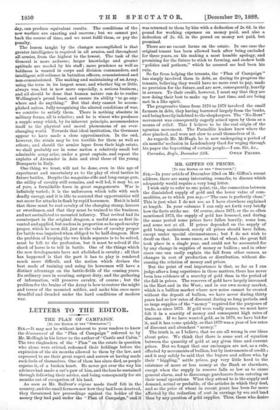MR. Ga.nt.N.IN ON PRICES.
[To THE EDITOR OP THE "SPECTATOR."]
Sin,—In your article of December 22nd on Mr. Giffen's recent address, there are many interesting remarks, to discuss which adequately would require a very long letter.
I wish only to refer to one point, viz., the connection between the diminished supply of gold and the lower value of com- modities, as to which you say,—" The case is perfectly clear."
This is just. what I do not see, as I have elsewhere explained at length. In your columns I can only set forth very briefly
how the facts strike me. Of course, since 1871, or the so often mentioned 1873, the supply of gold has lessened, and during the same period some prices have fallen heavily, some less,
and some not at all. If prices depended on the supply of
gold being maintained, surely all prices should have fallen, except under special circumstances ; but I do not wish to dwell on that. In some cases, as that of wheat, the great fall took place in a single year, and could not he accounted for by any change in supplies of money or bullion ; and in other
cases one can easily explain the fall from other causes, as. changes in cost of production or distribution, without dis- cussing the relation of money and prices.
But the point of real importance is that, so far as I can judge after a long experience in these matters, there has never been less evidence of a scarcity of gold than in the period or the fall in prices. The reserves of gold have largely increased in the East and in the West; and in our own money market,.
which is a bullion market where new notes cannot be created_ without the deposit of bullion, we have never during thirty years had so low rates of discount during so long periods, and.
so large supplies of the " money " required for the purposes of trade, as since 1873. If gold were really scarce, we must have- felt it in a scarcity of money and consequent high rates of discount. If we have wanted gold, as in 1878, we have bid for it, and it has come quickly, so that 1879 was a year of low rates of discount and abundant "money."
The truth is, as I believe, that we are all wrong in our ideas about price. We think that there is some sort of equation between the quantity of gold at any given time and current prices. But we forget that our exchanges are not, as a rule, effected by movements of bullion, but by instruments of credit ; and it may safely be said that the buyers and sellers who, by their " higgling," settle prices, pay very little heed to the existence of more or less money at the Bank or elsewhere, except when the supply in reserve falls so low as to cause'
general alarm, and to discourage purchasers from entering on their usual operations. What they attend to is the supply and demand, actual or probable, of the articles in which they deal, and so the price of wheat in recent years has been far more affected by the reduction of cost in carriage by sea and land than by any question of gold supplies. Thus, those who desire
to raise prices by increasing the supplies of money may find themselves deceived, and it would certainly be most rash to alter our standard in order to restore prices to their old level, until we are quite sure that we have discovered the real causes of the fall.
I am confident that invention in its various forms is the real cause of the fall, and he would be a bold man who would endeavour to deprive mankind of the natural fruits of man's 43 Grosvenor Square, December 26th.



































 Previous page
Previous page